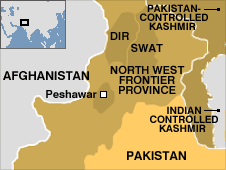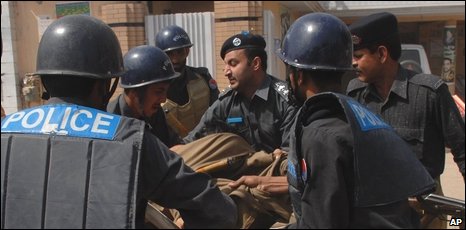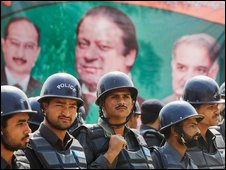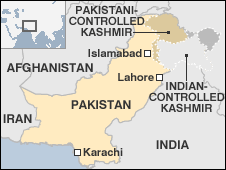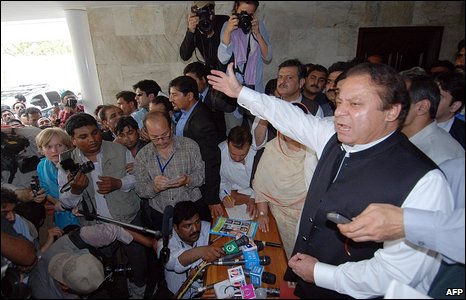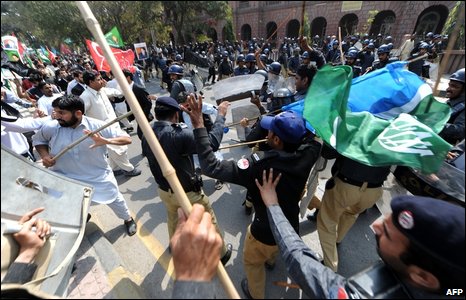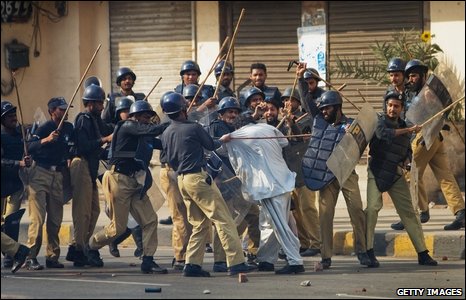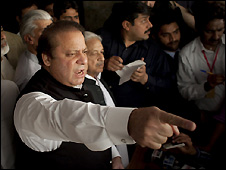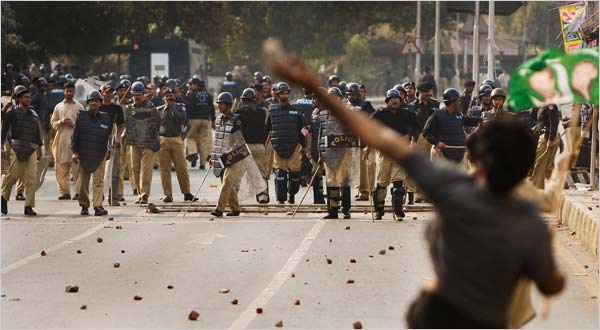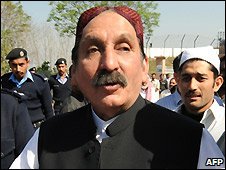- Reaction score
- 0
- Points
- 110
A little more in depth analysis.
http://www.time.com/time/world/article/0,8599,1842131,00.html
Pakistan's military and the U.S. forces operating across the country's mountainous border with Afghanistan have become locked into a confusing and potentially dangerous game of brinkmanship over how to fight the al-Qaeda and Taliban militants sheltering on Pakistani soil. U.S. military strikes on Pakistani soil are provoking increasingly strident warnings from Pakistan's military and political leadership, and they are continuing despite Washington's reassurances about respecting Pakistani sovereignty. Still, many believe the Pakistanis are engaged in ritual denunciation of U.S. actions primarily for domestic political consumption.
Exasperated by Pakistan's failure to wipe out the militant sanctuaries on its soil, Washington decided earlier this month to take matters into its own hands. The first known ground assault of the campaign, staged by U.S. Special Operations troops in Angoor Adda, a village in South Waziristan, was followed by stepped up air strikes on suspected militants by pilotless drones. Pentagon officials had suggested in recent weeks that the U.S. would be "testing" the new Pakistani government by stepping up its attacks in western Pakistan to gauge Islamabad's reaction. Previously, U.S. actions had been been limited to launching missile strikes or hot pursuits into Pakistani territory without the consent of the Pakistani government. The Sept. 3 attack was the first significant cross-border U.S. ground strike without prior Pakistani approval — a change approved by President Bush in July. That raid, which Pakistan's military says killed up to 20 people including civilians, triggered angry criticism across Pakistan. As the protector of his country's sovereignty and nervous about rising anti-American sentiment, Pakistan's army chief issued an unprecedented warning in response to the raid. "No external force is allowed to conduct operations inside Pakistan," Gen. Ashfaq Parvez Kayani said. The statement was cheered by an anxious public and, in a sign of the military's influence, it was echoed by leading members of the government who had, until then, been reluctant to speak on the issue.
The ramping up of U.S. operations, Pakistani government and military officials believe, reflect a desperate bid to "get Bin Laden" before the Bush Administration leaves the White House. "It is all about the U.S. elections and Bush's legacy," says an aide to newly elected President Asif Ali Zardari. "But what purpose has it served? They have not got any high-value targets, and the public outrage only threatens to destabilize our new democratic government."
Zardari's government claims to be escalating its own campaign against the militants after attempts at negotiations proved fruitless, and believes that its own efforts are undermined by U.S. operations. "The [Pakistani counterinsurgency] operation in Bajaur is the most intense for many years. It is not popular with the public, but we are doing it," says the Zardari aide, who spoke on condition of anonymity. "And in Waziristan, after a lot of effort we got the Waziri tribes to unite against [Taliban commander] Baitullah Mehsud. But after all these drone strikes, they got dejected."
The U.S. has launched six air strikes into the tribal areas in the course of this month alone, the latest coming on Sept. 17 at a suspected militant training camp in South Waziristan. For all their insistence on sovereignty, the Pakistani army has not reacted militarily, nor has the government taken steps to break off diplomatic ties. Their only complaint, military analysts said, is over the use of ground troops. For the past six years, the CIA has routinely flown pilotless drones over Pakistan's tribal areas to collect intelligence and fire at select targets. Only when attacks have claimed large-scale civilian casualties, as in the abortive 2006 attempt to kill al-Qaeda No.2 Ayman al-Zawahiri, have the Pakistani authorities bothered to go through the more advanced motions of protest.
While this month's air strikes have passed with only comment from the Pakistan army, fears of a U.S.-Pakistan confrontation were sparked on Sept. 16 by media reports that Pakistani paramilitary troops may have fired warning shots to prevent U.S. military helicopters from returning to Angoor Adda. The Pakistan army swiftly denied the incident. "The helicopters did not enter Pakistani territory and the Pakistan army did not do the firing," says Maj. Gen. Athar Abbas, the military's chief spokesman. "The firing was done by local Waziri tribesmen."
Still, the Associated Press followed up by reporting that the Pakistan army had issued fresh orders "to open fire on U.S. troops if they launch another raid across the Afghan border." Again, General Abbas, who was quoted in the story, disputes the claim: "The comments were taken out of context," he says. "There was no new order issued. As the army chief has said, we reserve the right to defend our territory and reply to aggression."
The picture was made even more confusing by Wednesday's strike, at a suspected militant training camp in the village of Bagh in South Waziristan. That air-strike came just hours after the Chairman of the Joint Chiefs of Staff Adm. Mike Mullen had visited Islamabad to calm fears about U.S. encroachment on Pakistan's turf. According to a statement issued by the U.S. Embassy in Islamabad, "Admiral Mullen reiterated the U.S. commitment to respect Pakistan's sovereignty and to develop further U.S.-Pakistani cooperation and coordination."
Speaking to Reuters, unnamed local intelligence officials said that the Wednesday strike was the product of improved "U.S.-Pakistani intelligence sharing". But Ahmad Mukhtar, the Pakistani defense minister, says he was taken aback by the attack. "The Mike Mullen visit was very nice and he was very understanding," Mukhtar says. "And now these air strikes have come as a surprise. There is no understanding that the air strikes should happen from the U.S. Whatever is on our side of the border, we will deal with. There is anxiety in the country, and the situation here was meant to be resolved now."
Zardari, who returned to Pakistan from a visit to London as news of the incident broke, had also suggested he believed that air strikes would end. Speaking to reporters after a lengthy meeting with Prime Minister Gordon Brown, he said: "I don't think there will be any more [air strikes]." In his meeting with Brown, Zardari had urged the British prime minister to persuade the Americans to refrain from further attacks on Pakistani soil. "The U.K. agrees with us that such moves are counterproductive," says the Zardari aide, who had been present at the meeting.
Still, despite the apparent discord over continuing air raids, it would be a mistake to exaggerate the differences between Washington and Islamabad on the issue. The U.S. has given the Pakistani military about $6 billion in aid since 9/11, and recently announced a plan to supply Pakistan with 18 new F-16 fighter planes to be armed with satellite guided bombs to take out militant encampments. "That's the element that is missing in the fight now on their western border," Air Force Major General Burton Field told a House panel earlier this month. Lacking precision-guided bombs, the Pakistani military has been forced to rely on ground operations against Taliban and al-Qaeda militants, which eliminates the element of surprise. And, says analyst Ayesha Siddiqa. "As far as the army's reaction is concerned, I haven't seen the Pakistan army say it no longer needs F-16s and military aid."
Siddiqa suggested that Gen. Kayani's protests over the raids may have been designed for domestic consumption."And where the public is concerned, there have been only a few demonstrations in Peshawar, which is natural," she added. "But again, that hasn't stopped the queues outside McDonald's and the visa section of the U.S. embassy. I think there is a lot of unhappiness and discomfort in Pakistan. But the reality, as Prime Minister Gilani recently said, is that we can't do anything. I think what the Americans have calculated is that this will not get out of control, and they will continue to pursue their policies."
—With reporting by Mark Thompson/Washington
http://www.time.com/time/world/article/0,8599,1842131,00.html
Pakistan's military and the U.S. forces operating across the country's mountainous border with Afghanistan have become locked into a confusing and potentially dangerous game of brinkmanship over how to fight the al-Qaeda and Taliban militants sheltering on Pakistani soil. U.S. military strikes on Pakistani soil are provoking increasingly strident warnings from Pakistan's military and political leadership, and they are continuing despite Washington's reassurances about respecting Pakistani sovereignty. Still, many believe the Pakistanis are engaged in ritual denunciation of U.S. actions primarily for domestic political consumption.
Exasperated by Pakistan's failure to wipe out the militant sanctuaries on its soil, Washington decided earlier this month to take matters into its own hands. The first known ground assault of the campaign, staged by U.S. Special Operations troops in Angoor Adda, a village in South Waziristan, was followed by stepped up air strikes on suspected militants by pilotless drones. Pentagon officials had suggested in recent weeks that the U.S. would be "testing" the new Pakistani government by stepping up its attacks in western Pakistan to gauge Islamabad's reaction. Previously, U.S. actions had been been limited to launching missile strikes or hot pursuits into Pakistani territory without the consent of the Pakistani government. The Sept. 3 attack was the first significant cross-border U.S. ground strike without prior Pakistani approval — a change approved by President Bush in July. That raid, which Pakistan's military says killed up to 20 people including civilians, triggered angry criticism across Pakistan. As the protector of his country's sovereignty and nervous about rising anti-American sentiment, Pakistan's army chief issued an unprecedented warning in response to the raid. "No external force is allowed to conduct operations inside Pakistan," Gen. Ashfaq Parvez Kayani said. The statement was cheered by an anxious public and, in a sign of the military's influence, it was echoed by leading members of the government who had, until then, been reluctant to speak on the issue.
The ramping up of U.S. operations, Pakistani government and military officials believe, reflect a desperate bid to "get Bin Laden" before the Bush Administration leaves the White House. "It is all about the U.S. elections and Bush's legacy," says an aide to newly elected President Asif Ali Zardari. "But what purpose has it served? They have not got any high-value targets, and the public outrage only threatens to destabilize our new democratic government."
Zardari's government claims to be escalating its own campaign against the militants after attempts at negotiations proved fruitless, and believes that its own efforts are undermined by U.S. operations. "The [Pakistani counterinsurgency] operation in Bajaur is the most intense for many years. It is not popular with the public, but we are doing it," says the Zardari aide, who spoke on condition of anonymity. "And in Waziristan, after a lot of effort we got the Waziri tribes to unite against [Taliban commander] Baitullah Mehsud. But after all these drone strikes, they got dejected."
The U.S. has launched six air strikes into the tribal areas in the course of this month alone, the latest coming on Sept. 17 at a suspected militant training camp in South Waziristan. For all their insistence on sovereignty, the Pakistani army has not reacted militarily, nor has the government taken steps to break off diplomatic ties. Their only complaint, military analysts said, is over the use of ground troops. For the past six years, the CIA has routinely flown pilotless drones over Pakistan's tribal areas to collect intelligence and fire at select targets. Only when attacks have claimed large-scale civilian casualties, as in the abortive 2006 attempt to kill al-Qaeda No.2 Ayman al-Zawahiri, have the Pakistani authorities bothered to go through the more advanced motions of protest.
While this month's air strikes have passed with only comment from the Pakistan army, fears of a U.S.-Pakistan confrontation were sparked on Sept. 16 by media reports that Pakistani paramilitary troops may have fired warning shots to prevent U.S. military helicopters from returning to Angoor Adda. The Pakistan army swiftly denied the incident. "The helicopters did not enter Pakistani territory and the Pakistan army did not do the firing," says Maj. Gen. Athar Abbas, the military's chief spokesman. "The firing was done by local Waziri tribesmen."
Still, the Associated Press followed up by reporting that the Pakistan army had issued fresh orders "to open fire on U.S. troops if they launch another raid across the Afghan border." Again, General Abbas, who was quoted in the story, disputes the claim: "The comments were taken out of context," he says. "There was no new order issued. As the army chief has said, we reserve the right to defend our territory and reply to aggression."
The picture was made even more confusing by Wednesday's strike, at a suspected militant training camp in the village of Bagh in South Waziristan. That air-strike came just hours after the Chairman of the Joint Chiefs of Staff Adm. Mike Mullen had visited Islamabad to calm fears about U.S. encroachment on Pakistan's turf. According to a statement issued by the U.S. Embassy in Islamabad, "Admiral Mullen reiterated the U.S. commitment to respect Pakistan's sovereignty and to develop further U.S.-Pakistani cooperation and coordination."
Speaking to Reuters, unnamed local intelligence officials said that the Wednesday strike was the product of improved "U.S.-Pakistani intelligence sharing". But Ahmad Mukhtar, the Pakistani defense minister, says he was taken aback by the attack. "The Mike Mullen visit was very nice and he was very understanding," Mukhtar says. "And now these air strikes have come as a surprise. There is no understanding that the air strikes should happen from the U.S. Whatever is on our side of the border, we will deal with. There is anxiety in the country, and the situation here was meant to be resolved now."
Zardari, who returned to Pakistan from a visit to London as news of the incident broke, had also suggested he believed that air strikes would end. Speaking to reporters after a lengthy meeting with Prime Minister Gordon Brown, he said: "I don't think there will be any more [air strikes]." In his meeting with Brown, Zardari had urged the British prime minister to persuade the Americans to refrain from further attacks on Pakistani soil. "The U.K. agrees with us that such moves are counterproductive," says the Zardari aide, who had been present at the meeting.
Still, despite the apparent discord over continuing air raids, it would be a mistake to exaggerate the differences between Washington and Islamabad on the issue. The U.S. has given the Pakistani military about $6 billion in aid since 9/11, and recently announced a plan to supply Pakistan with 18 new F-16 fighter planes to be armed with satellite guided bombs to take out militant encampments. "That's the element that is missing in the fight now on their western border," Air Force Major General Burton Field told a House panel earlier this month. Lacking precision-guided bombs, the Pakistani military has been forced to rely on ground operations against Taliban and al-Qaeda militants, which eliminates the element of surprise. And, says analyst Ayesha Siddiqa. "As far as the army's reaction is concerned, I haven't seen the Pakistan army say it no longer needs F-16s and military aid."
Siddiqa suggested that Gen. Kayani's protests over the raids may have been designed for domestic consumption."And where the public is concerned, there have been only a few demonstrations in Peshawar, which is natural," she added. "But again, that hasn't stopped the queues outside McDonald's and the visa section of the U.S. embassy. I think there is a lot of unhappiness and discomfort in Pakistan. But the reality, as Prime Minister Gilani recently said, is that we can't do anything. I think what the Americans have calculated is that this will not get out of control, and they will continue to pursue their policies."
—With reporting by Mark Thompson/Washington

